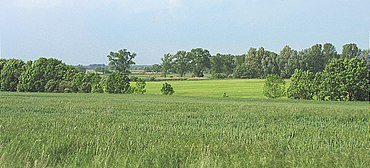Lynx (landform)
Luch ( das or die [luːx] ) is the north-east German name for an extensive, moored lowland, especially in Brandenburg . Luche are mainly found in young moraine areas . But they also occur in the old moraine landscape.
Location and history
Luche have generally formed in the large glacial valleys or in their side valleys, the glacial valleys . After the end of the ice age , a rising groundwater level in the post-ice age led to the formation of swamp bogs . The peat thickness is usually not great. Mostly it is less than 2 m. Before the construction of artificial drainage networks, excess water often remained in ponds in the Luchen. The difference in name to neighboring " breaks " such as the Oderbruch in the east and the Hohennauenschen Bruch in the west, touched by the Havel, indicates the difference to lowlands with natural flowing waters .
Most of the Luche in Brandenburg have now been transformed and taken into culture by humans. After the improvement , they are now usually used as grassland . Archaeologists like Klaus Goldmann consider that reclamation began in part in Slavic times, but was later wiped out again by deteriorating drainage conditions, such as the Havel mill dams.
There are numerous Luche in Brandenburg, the larger ones are also known beyond the state borders. Some place names are also derived from the term luch . Examples are Luckenwalde , Doberlug and Luckau . (In Luckau (Wendland) , however, the place name is interpreted differently: Here it comes from the Slavic lauck and means leek or onion field.)
When the short version Luch is used, the area of the Havelländisches Luchs or the Rhinluchs is usually meant.
Word and word origin
The word is used as a feminine (plural: die Luche ) or as a neuter (plural: die Luche ). Attributed the designation to West Slavic words for "marshy ground, wet meadows, swampy, wooded valley", including Polish Łęg , Polabisch laug , Kashubian log , Upper Sorbian Luh , Lower Sorbian Lug . The landscape name Lausitz , or Luzici in 1005 , comes from this. In the oldest German version of the Lower Sorbian place name Doberlug (literally: "good meadow land") it is even handed down as a Dobraluh with a fricative end. In some wetlands, the Slavic name was not taken phonetically but translated, for example in the Friedlander Große Wiese , which only changed from a moor to a meadow in the 20th century, and in the Laßzins meadow near Peitz .
Examples
- Some of these luche are parts of the larger luche as well -
- Golmer Luch
- Great luch
- Havelländisches Luch
- Rhinluch
- Red lynx
- Long luch
- Lynx meadows
- Old Zaucher Luch
- Broad luch
- Crooked lynx
- Luch on the Margaretenhöhe
- Reichardtsluch
Web links
Individual evidence
- ↑ Luch . In: duden.de; see also Wiktionary
- ↑ Wolfgang Pfeifer: Etymological Dictionary of German. Berlin 1989, sv
- ^ Fritz Beckmann (ed.): Friesack district. Forays through Ländchen and Luch. Geiger, Horb am Neckar 1996, ISBN 3-89570-131-9 , pp. 12-13
- ↑ Doberlug-Kirchhain. City history



